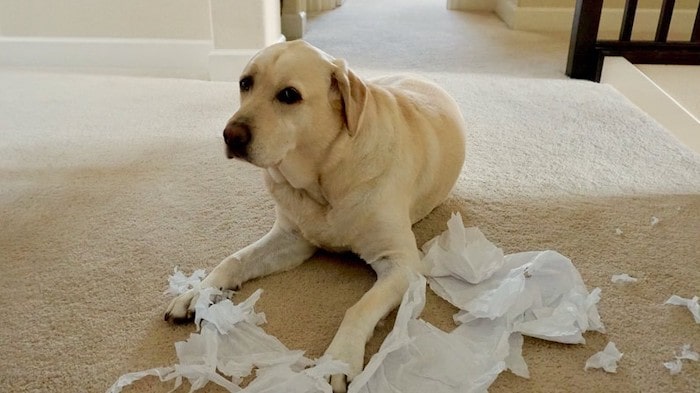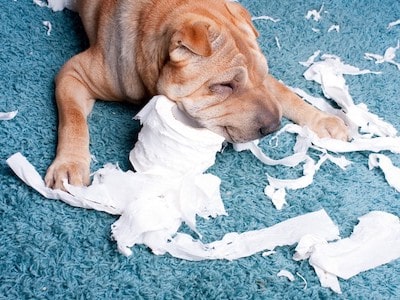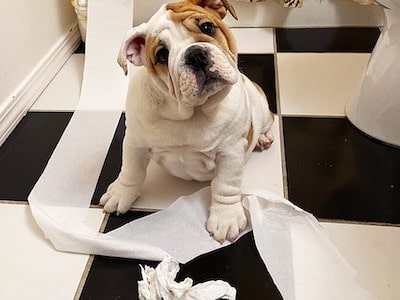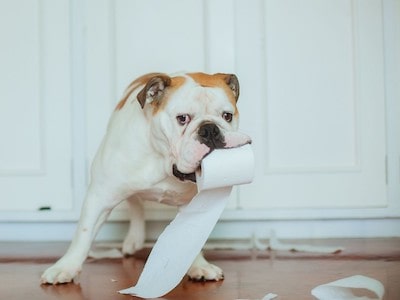Have you ever caught your furry friend chomping down on a piece of paper, leaving you puzzled and wondering, “Why does my dog eat paper?” It’s not an uncommon behavior among our canine companions, and while it may seem strange to us, there are actually several reasons why dogs indulge in this peculiar habit.
From teething troubles and boredom to nutritional deficiencies and instinctual behaviors, there’s more to paper munching than meets the eye.
In this article, we’ll delve into the fascinating world of dogs and their affinity for paper, exploring the various factors that contribute to this behavior.
So, grab a pen and paper (just make sure your dog doesn’t get hold of it!) as we uncover the truth behind why our beloved pups can’t resist the taste of paper.
Contents
What is Pica and Why Do Dogs Have It?
Pica is a term that refers to the ingestion of non-food items, such as paper, rocks, dirt, or clothing. Pica can affect both humans and animals, and it can have various causes and consequences.
Dogs are especially prone to pica because they are naturally curious and like to explore their environment with their mouths. They may also eat non-food items out of boredom, stress, anxiety, hunger, or nutritional deficiencies.

Pica is not necessarily a sign of a serious problem, but it can also indicate an underlying medical or behavioral issue that needs to be addressed. Some of the common causes of pica in dogs include:
- Dental problems: Dogs may chew on paper to relieve pain or discomfort from tooth decay, gum disease, or oral infections.
- Digestive problems: Dogs may eat paper to cope with nausea, vomiting, diarrhea, constipation, or inflammatory bowel disease.
- Parasites: Dogs may eat paper to try to expel worms or other parasites from their intestines.
- Anemia: Dogs may eat paper to supplement their iron intake if they have low red blood cell count or hemoglobin levels.
- Diabetes: Dogs may eat paper to satisfy their increased appetite or thirst caused by high blood sugar levels.
- Hormonal imbalances: Dogs may eat paper due to changes in their hormones during pregnancy, lactation, or heat cycles.
- Cognitive dysfunction: Dogs may eat paper as a result of age-related cognitive decline or dementia that affects their memory, perception, or judgment.
Common Causes of Paper Eating in Dogs
Apart from the medical reasons mentioned above, dogs may also eat paper for behavioral or psychological reasons. Some of the common causes of paper eating in dogs include:
- Boredom: Dogs may eat paper because they are not getting enough mental stimulation or physical exercise. They may also lack appropriate toys or chew items to keep them occupied.
- Stress: Dogs may eat paper because they are feeling anxious, nervous, or fearful. They may also suffer from separation anxiety when left alone or in unfamiliar situations.

- Attention-seeking: Dogs may eat paper because they want to get your attention or reaction. They may also learn that eating paper gets them what they want, such as food, treats, or playtime.
- Copying: Dogs may eat paper because they see other dogs or humans doing it. They may also imitate their mother’s behavior if they were weaned too early or not properly socialized.
Potential Risks and Complications of Paper Ingestion
Eating paper may seem harmless at first glance, but it can actually pose some serious risks and complications for your dog’s health and well-being. Some of the potential dangers of paper ingestion include:
- Choking: Paper can get stuck in your dog’s throat or mouth and cause choking or suffocation. This can be life-threatening if not treated immediately.
- Obstruction: Paper can form a blockage in your dog’s stomach or intestines and prevent food and water from passing through. This can cause vomiting, diarrhea, dehydration, abdominal pain, weight loss, lethargy, and infection. This can also be fatal if not treated promptly.

- Toxicity: Paper can contain harmful substances such as ink, glue, chemicals, or metal staples that can poison your dog. This can cause symptoms such as drooling, tremors, seizures, coma, and death.
- Inflammation: Paper can irritate your dog’s digestive tract and cause inflammation or ulceration. This can lead to bleeding, perforation, peritonitis, or sepsis.
How to Prevent and Treat Paper Eating Behavior
If your dog eats paper occasionally and does not show any signs of distress or illness, you may not need to worry too much.
However, if your dog eats paper frequently or excessively and exhibits any symptoms of discomfort or disease, you should consult your veterinarian as soon as possible.
Your vet can diagnose the cause of your dog’s pica and prescribe the appropriate treatment.
Depending on the severity and frequency of your dog’s paper eating behavior, your vet may recommend one or more of the following options:
- Medication: Your vet may prescribe medication to treat any underlying medical condition that is causing your dog’s pica. For example, antibiotics for infections, anti-parasitics for worms, supplements for deficiencies, insulin for diabetes etc.

- Surgery: Your vet may perform surgery to remove any foreign object that is causing an obstruction in your dog’s digestive system. This may involve endoscopy (inserting a camera through the mouth) or laparotomy (making an incision in the abdomen).
Behavior modification: Your vet may refer you to a behaviorist or trainer who can help you modify your dog’s behavior using positive reinforcement techniques. For example,
- Providing adequate mental stimulation and physical exercise for your dog
- Offering appropriate toys and chew items for your dog
- Redirecting your dog’s attention away from paper
- Praising your dog for chewing on appropriate items
- Ignoring your dog’s attention-seeking behavior
- Avoiding punishment or scolding for eating paper
- Creating a safe and stress-free environment for your dog
FAQ
Is it harmful for my dog to eat paper?
Consuming small amounts of paper is generally not harmful to dogs. However, swallowing large quantities or eating paper with ink or chemicals can potentially lead to digestive issues, blockages, or toxicity. It’s best to discourage excessive paper consumption and ensure your dog has safe and appropriate chew toys.
What should I do if my dog eats a large amount of paper?
If your dog ingests a large quantity of paper or shows signs of distress such as choking, vomiting, or abdominal pain, it’s important to seek immediate veterinary assistance. The veterinarian can assess the situation and determine the best course of action, which may include monitoring, inducing vomiting, or performing an x-ray to check for any blockages.
Can eating paper be a sign of anxiety in dogs?
Yes, anxiety can contribute to a dog’s paper-eating behavior. Some dogs may resort to chewing or eating paper as a way to self-soothe or alleviate stress. If you suspect anxiety is a factor, it’s beneficial to address the underlying causes of anxiety and consider techniques such as positive reinforcement training, providing safe spaces, and potentially seeking professional help from a veterinarian or a certified animal behaviorist
Should I be concerned if my puppy eats paper?
Puppies explore the world with their mouths, and chewing on various objects, including paper, is a common behavior during their teething phase. However, it’s essential to supervise them closely to ensure they don’t ingest large amounts or swallow pieces that could cause harm. Provide appropriate teething toys and redirect their attention whenever they show interest in paper.
Final Thoughts
Paper eating in dogs is a common form of pica that can have various causes and consequences. While some cases of paper eating are harmless and occasional, others are serious and chronic. If you notice any signs of distress or illness in your dog after eating paper, you should seek professional help immediately.
Your veterinarian can diagnose the cause of your dog’s pica and provide the best treatment option for your dog’s condition. Your behaviorist or trainer can help you prevent and manage your dog’s paper eating behavior using positive reinforcement techniques.
By understanding why your dog eats paper and how to stop it, you can ensure your dog’s health and happiness.

A retired veterinary technician and full-time dog parent. James knows to serve the community with the best of his knowledge of animal healthcare. He has been working in a known veterinary clinic for quite a few years. He loves reading blogs on pet nutrition and writes unbiased reviews of dog products.


